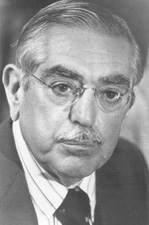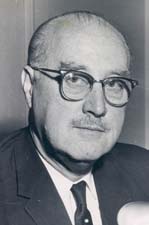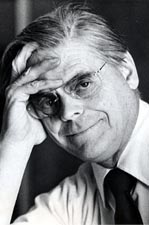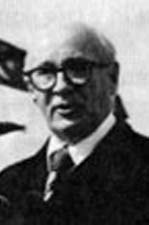R.R. Wilson's Congressional Testimony, April 1969
On April 17, 1969, Robert R. Wilson testified in front of Congress' Joint Committee on Atomic Energy as part of the AEC Authorizing Legislation for FY 1970. Included here is his famed quote about the value of building Fermilab's first accelerator. His entire testimony from the hearing follows the excerpt.
EXCERPT
SENATOR PASTORE. Is there anything connected in the hopes of this accelerator that in any way involves the security of the country?
DR. WILSON. No, sir; I do not believe so.
SENATOR PASTORE. Nothing at all?
DR. WILSON. Nothing at all.
SENATOR PASTORE. It has no value in that respect?
DR. WILSON. It only has to do with the respect with which we regard one another, the dignity of men, our love of culture. It has to do with those things.
It has nothing to do with the military. I am sorry.
SENATOR PASTORE. Don't be sorry for it.
DR. WILSON. I am not, but I cannot in honesty say it has any such application.
SENATOR PASTORE. Is there anything here that projects us in a position of being competitive with the Russians, with regard to this race?
DR. WILSON. Only from a long-range point of view, of a developing technology. Otherwise, it has to do with: Are we good painters, good sculptors, great poets? I mean all the things that we really venerate and honor in our country and are patriotic about.
In that sense, this new knowledge has all to do with honor and country but it has nothing to do directly with defending our country except to help make it worth defending.
COMPLETE TESTIMONY
Read Wilson's entire testimony from the beginning of the hearing below.
SENATOR PASTORE. Here we are. We have these Senators going all over the District of Columbia. It has been on the front pages. They are going all over the country showing how many people are starving, how many people are hungry, how many people live in rat-ridden houses.
Here we are, asking for $250 million to build a machine that is an experimental machine, in fundamental high energy physics, and we cannot be told exactly what we are trying to find out through that machine.
DR. WILSON. Senator Pastore, I and my colleagues will be spending a good part of our lives building and using this machine. We have a deep and very personal commitment to it. May I try to explain what it is we are trying to find out.
We are building this machine for specific purposes as well as for general exploration. In the first place we expect to get answers to questions that men have been asking for a long time.
One of these questions has to do with simplicity. Is there a simple understanding of nature? Are there a few elementary particles which could explain all of the complexity of matter and of life?
Our present picture is one of tremendous complexity. You have heard about the hundreds of so-called "elementary" particles. But we believe that there must be an underlying simplicity, perhaps three sub-particles or something of that kind, that will bring clarity and make that which is so complex now turn out to be very simple. Going to 200 Bev gives us a good chance to find such subparticles.
There is another aspect of our study. This concerns the different kinds of forces. Three of these are now quite familiar: gravitational forces, electromagnetic forces, nuclear forces. The understanding of these three forces has been all important to our past and will be all important to our future, to the future of all men. There is also a mysterious fourth kind of force called the "weak" force.
We know just enough about this weak force to expect that it may become stronger and stronger as the energy of the colliding particles is increased. We also now know that there are specific experiments that can be made which will tell us about the nature of this force as we move into the energy range that will be made available by our 200-Bev synchrotron. It has become perfectly clear to us that there are specific experimens that can be done with the 200-Bev machine that cannot be done with other machines, and which will give us definitive information about the "weak" force.
Now, forces, sir are the movers of the atoms, the basis of all motion and hence of life and of technology. When I was a student, the nuclear force was considered to be an academic matter, a force which had nothing to do with our lives. We studied it only in a quest for simplicity, just for the pure understanding of it. It turns out that this knowledge has made vast amounts of energy available. A deeper understanding and a more fundmental understanding of the "weak" force could be as relevant to our lives as the other forces, not only in the gratification we will have in the knowledge itself, but in the technology that will inevitably come from that understanding.
SENATOR PASTORE. The thing that bothers me is that some of the same people who are looking for these unknown, imaginary forces that may be real, are the same people who are opposed to the ABM because they say it will not work.
What will work, and what will not work? You say that we are looking for something that will explain the forces of nature. Could you be a little more explicit about that? In what way will it affect nature, do you think?
DR. WILSON. In looking for the nature of the forces that would hold the particles together in the nucleus-
SENATOR PASTORE. Why?
DR. WILSON. We did find out how to control the nucleus, how to make nuclear energy. That is what this committee is all about. Nuclear energy has affected nature. One can see the possibility now of using nuclear forces for controlling our environment better than ever, or digging canals, or for preventing pollution. For example, I live in Chicago, and the more nuclear plants that are built near Chicago, the more bearable is the air that I breathe there. I can see a direct effect of nuclear energy in decreasing pollution.
We will also see a decrease in the cost of electricity, for all men, especially as time goes on. Because of the construction of cyclotrons in the past, we see these things coming to pass within our lifetimes. I am confident that in a similar way, as we learn about this weak force, we will ultimately understand more about the other forces and then be able to utilize them more fully. We know that this force although mysterious, is just as real as the other forces, we know how to go about studying it, and that is what we are getting down to doing.
Had we not built those previous nuclear accelerators, we would not have nuclear energy today. We would have more pollution of the air we breathe because more coal would be burned, while it lasted.
Because of the kind of research that we are now starting, men will eventually be able to enjoy a richer life, in an intellectual and spiritual sense certainly, but also in their physical well-being.
SENATOR PASTORE. Is there anything connected in the hopes of this accelerator that in any way involves the security of the country?
DR. WILSON. No, sir; I do not believe so.
SENATOR PASTORE. Nothing at all?
DR. WILSON. Nothing at all.
SENATOR PASTORE. It has no value in that respect?
DR. WILSON. It only has to do with the respect with which we regard one another, the dignity of men, our love of culture. It has to do with those things.
It has nothing to do with the military. I am sorry.
SENATOR PASTORE. Don't be sorry for it.
DR. WILSON. I am not, but I cannot in honesty say it has any such application.
SENATOR PASTORE. Is there anything here that projects us in a position of being competitive with the Russians, with regard to this race?
DR. WILSON. Only from a long-range point of view, of a developing technology. Otherwise, it has to do with: Are we good painters, good sculptors, great poets? I mean all the things that we really venerate and honor in our country and are patriotic about.
In that sense, this new knowledge has all to do with honor and country but it has nothing to do directly with defending our country except to help make it worth defending.
SENATOR PASTORE. Is there any necessity for pushing for completion of this accelerator so that you will have a beam by June of 1972?
DR. WILSON. To me, it is like planting a tree. You know the story about the master who asked his servant to plant a tree in the afternoon. "I am too busy to do it then," said the servant, "besides, there is no hurry for it will take 20 years to grow." "In that case, plant it this morning," replied the wise master.
SENATOR PASTORE. When you consider priorities, I know exactly what you mean, provided we have the money.
After all, when you have people who are hungry, the big question here is: Is it more important to put a man on the moon, or to fill the stomachs of our starving children?
DR. WILSON. It is most important to fill the stomachs of our starving children.
SENATOR PASTORE. You would put that as the first priority, would you not?
DR. WILSON. Yes, sir.
SENATOR PASTORE. Of course.
DR. WILSON. But it is also important to get on with the things that make life worth living, and, fortunately, it is possible to do these things in a manner which also contributes to the feeding of hungry children. We have seen great developments in the science of elementary particles in this country-a golden age of physics. We should not lose the tremendous momentum that has built up in this field. We should not pass up this opportunity. We have a great American tradition. The moment to move is here. We have the men who are ready and enthusiastic to get on with it. If we falter, I can see the whole effort dispersed and lost.
SENATOR PASTORE. My experience has been it is easy to authorize, but hard to get the money.
Let me ask you this question: Why do we set this target date for June 1972? Could that be extended?
DR. WILSON. Of course it could be extended.
SENATOR PASTORE. How much harm would it do if you did?
DR. WILSON. For one thing, it will cost more money. The extra money will take food away from the mouths of the babies in 5 years, unless they are then being adequately fed.
We have assembled a group of talented men, a group of just the right size, to do this job in this time. Now those men could easily take much more time. Their salaries will continue no matter what. It will just cost more.
But there is also a question of doing something with enthusiasm, which is how we are doing it, and with a determination to do it rapidly and economically.
If we are not to do it with enthusiasm and rapidly, then it can still be done, but it will be done by second-rate people in a bureaucratic manner and it will be done expensively.
SENATOR PASTORE. I am going to make the same argument you are making now when I go into conference with the House, but you will be surprised how those ears are plugged.
I don't want to get into the academics of this, because after all I am supporting this accelerator. I don't want any misunderstanding. Especially if you call it the Enrico Fermi Accelerator.
I want a practical argument for when we get down to the funding of this, and someone says, "All right, it is authorized for $250 million, but you are asking for $96 million this year. If we made this $50 million, what would it do to you?"
I want to get some answers. What would it do to you?
DR. WILSON. It will have one effect: it will slow us down. When I was here last year, we asked for $75 million. Reason prevailed, and we came down to $25 million. We even accommodated to the $14.5 million we eventually received.
I am still determined, and my colleagues in the laboratory, to do the job on the 5-year schedule. However, now we are asking for $96 million in order to keep to that schedule.
CHAIRMAN HOLIFIELD. Is that to spend this year?
DR. WILSON. No. That is to obligate. The spending will be somewhat less, of course.
CHAIRMAN HOLIFIELD. Now you are getting to it. What is your spending program? In other words, out of this $96 million authorization for the fiscal year 1970?
DR. McDANIEL. Estimated at about $20 million, sir.
SENATOR PASTORE. The point is, unless you appropriate, you cannot obligate. That is the point. No matter what you spend, you have to have the authority to obligate, and that comes not from the authorization, it comes from the money.
DR. WILSON. We need the obligational authority for $96 million. Our spending will be less than that.
SENATOR PASTORE. In other words, we would have to appropriate the $96 million for you to carry out your job, no matter what you spent, because you will be obligating all that money, obligating $96 million, which will be spent beyond this fiscal year.
DR. WILSON. Yes.
SENATOR PASTORE. You only expect to spend $20 million, but if we gave you a funding of $20 million, then you could obligate the $20 million, and that would throw it out of kilter.
DR. WILSON. I am more optimistic about our ability to spend. I would expect to spend somewhat more than the $20 million. However, that is the figure that results from the customary ratio of costs and obligations.
SENATOR PASTORE. Essentially, the major purpose of this bevatron is for fundamental high-energy physics research, which is an educational and academic process, is it not?
DR. WILSON. And a cultural process, yes, but with the firm expectation that technological developments will come. Directly, but after a very long time; from the results of the research will come new technology. However, there will be a bonus that will come indirectly but very soon, through the technological inventions, that is "Spin-off," that results whenever such work is done.
Thus, because we are doing extremely difficult technical things, and because we are working in a strange kind of research, we know from past experience that new techniques inevitably develop, techniques which have paid, more than paid, for the cost of the basic research that was not pointed to such developments.
The klystron of the linac at Stanford, the vacuum pumps for the early cyclotron research, and the high-frequency oscillator tubes which were so valuable during the war, computer techniques, all these resulted from work on accelerators.
SENATOR PASTORE. Would you say as far as you know, the whole scientific community is behind this, without a dissent?
DR. WILSON. They do not dissent to me, sir.
CHAIRMAN HOLIFIELD. You know, Dr. Wilson, as I listened to your eloquent appeal for this, my mind went back before the days of Enrico Fermi to a time when St. Paul stood before King Agrippa, and King Agrippa said to St. Paul that he wanted him to explain his belief in the Christian principles. St. Paul was so eloquent that when he got through, King Agrippa said, "Almost thou persuadest me to be a Christian."
I am saying that, leaving out the "almost." I am saying, "Thou hast persuadest me to support this to the best of my ability."
SENATOR PASTORE. That is fine, but I was not worrying about Agrippa. I was a little worried about the taxpayers a-griping.
CHAIRMAN HOLIFIELD. The I think I should repeat for my colleague who sits on the Appropriations Committee, and anything that I can say that will strengthen his soul and purpose to where he can become as eloquent as I know he has been on many occasions, that I went through a little exercise when he was not here.
I want you to get the full benefit of it.
I had the morning Post before me, which said in a right- hand column that our gross national product this year would be over $900 billion. It went on to say that corporate profits in 1968 were the highest they had ever been in the history of this country, or in the world.
SENATOR PASTORE. $51 billion, after taxes.
CHAIRMAN HOLIFIELD. And the per capita earnings of our people have gone up.
SENATOR PASTORE. To $2,700 per year.
CHAIRMAN HOLIFIELD. Right. And that employment is at an alltime high.
SENATOR PASTORE. 75.9 million.
CHAIRMAN HOLIFIELD. And unemployment is at an alltime low.
SENATOR PASTORE. 2.8 million, or 2.6 percent.
I am making a speech Monday night. I know all of these figures.
CHAIRMAN HOLIFIELD. I have made this speech before a skeptical group of 400 big business people who thought we were in a financial crisis.
I can go on with some more, that the annual savings are the greatest they have ever been in our savings institutions in this country.
Therefore, I state unequivocally that we are not in a crisis, that this country is in a position to build a half dozen 200 Bev's, if we had the guts to go ahead, because we have the facilities to do it, we have the greatest productive machinery in the world.
I deny the fact that we are in a financial crisis. I say that about 98 percent of this financial crisis is hocum, and propaganda.
You use those figures you know so well when you get before your friends.
SENATOR PASTORE. I know, but I wish you would talk to Wilbur Mills.
CHAIRMAN HOLIFIELD. I will.
DR. WILSON. I wonder if I can say one last thing.
CHAIRMAN HOLIFIELD. Now that you are confirmed, you may go ahead.
DR. WILSON. We do expect to pay our way, Senator Pastore. When we spend Federal money, the taxpayers' money, then we have an obligation to give a fair return immediately. One of the things that we are doing, I am sure, is near and dear to your heart. We are taking a very positive stand with regard to racial problems.
We have spent a large amount of time and effort on open housing.
By now, essentially all of the communities in the vicinity of the project, some 20, have passed open housing legislation. We have instituted a training program in collaboration with Oak Ridge National Laboratory, where we have taken young men out of the inner city of Chicago.They came out to our laboratory for a period of orientation. Then we sent them to Oak Ridge for technical training. In 6 months, they will be back with guaranteed jobs, 23 young men.
Twenty percent of our staff are nonwhite. We are going beyond that. Every time we let a contract, we have a prebid conference. We have Mr. Kennard Williams, our equal opportunity officer, read the law to the contractors. We have found them most cooperative, for they are anxious to see a solution to the racial problem too. We have also initiated a program of finding and then spending much of our money with small black industries. In other words, we are directly channeling some of that $250 million so as to help fill those hungry mouths you were describing.
SENATORE PASTORE. I congratulate you.
REPRESENTATIVE PRICE. You already have people from minority groups working on the site now?
DR. WILSON. We certainly do.
CHAIRMAN HOLIFIELD. Senator Pastore was in the forefront of this principle, and fought for it from the beginning.
SENATORE PASTORE. That was my only objection at the time.
CHAIRMAN HOLIFIELD. I know it. I sometimes think you objected in order to achieve the result that is now being achieved.
SENATORE PASTORE. I hope I am just as successful on Enrico Fermi. I want to get these Congressmen off my back.
CHAIRMAN HOLIFIELD. You cannot get the Senator off the track. He is going to stay right with Enrico Fermi.
SENATORE PASTORE. Thank you, Dr. Wilson.






